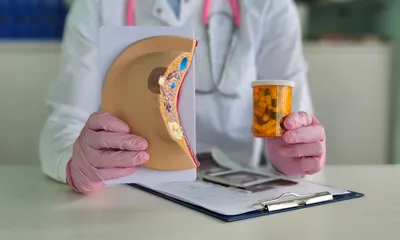Infertility
-
Description
-
Signs & Symptoms
-
Anatomy
-
Cause
-
Diagnosis
What is Infertility?
A woman is considered to be dealing with infertility if she is unable to conceive a child and become pregnant despite having sexual intercourse with a man or receiving artificial insemination. This inability is often a source of distress with regards to family planning for a man and woman, as well as for others who wish to have a child outside of the standard familial arrangements. Women can be very distressed over infertility, and particularly so when it is prolonged and if assisted reproduction technologies like IVF are ineffective.
What Causes Infertility?
The most common cause for infertility in women is being of advanced age, and women who are under the age of 35 will find it easier to conceive. Individual physiologies will make that age range approximate, but most women who experience infertility will be in their later 30s or older. Infertility may be more of a challenge if the woman is smoking, using substances, being exposed to chemicals, or she used contraceptives for a long time in her younger years.
Endometriosis, ovulation disorders, sexually transmitted infections, and uterine abnormalities may also factor into infertility. Being overweight can also be disadvantageous when a woman is trying to get pregnant. Pregnancy struggles may also be related to the men and their low sperm count or sperm motility problems can also prevent a woman from conceiving.
Signs of Infertility
Failed pregnancy tests any time after 3 weeks of unprotected sex is going to be the indicator that a woman may be infertile, or that her partner is experiencing reproductive difficulties that are preventing her from getting pregnant. This diagnosis tends to be confirmed if the inability to get pregnant persists after the woman goes through assisted reproduction technologies like in vitro fertilization.
Infertility Treatment
IVF is the most common approach for infertility treatment, and women will take medications like Follistim AQ to stimulate the development of follicles in the ovaries and spermatogenesis in the testes for men. Timed intercourse and finding a woman’s fertility window is also a part of trying to get pregnant in a clinic, and this is based on determining the woman’s ovulation cycle and timing the sexual intercourse so that it is more likely she gets pregnant.
IUI (intra-uterine insemination) is also a possible infertility treatment for women. As part of the procedure, healthy sperm are placed directly in the uterus around the time that the ovary releases one or more eggs that are ready for fertilization. It is a more complicated procedure, but if a woman is deemed to be a good fit for IUI it can be discussed at a fertility clinic for women.
Signs & Symptoms
- Failed pregnancy tests after unprotected sex
- Inability to conceive after assisted reproduction technologies
- Irregular or absent menstrual cycles
- Hormonal imbalances
- Signs of underlying conditions like endometriosis
Anatomy
- Uterus
- Ovaries
- Fallopian tubes
- Endometrium
- Sperm ducts (in men)
Cause
- Advanced age
- Smoking
- Long-term contraceptive use
- Endometriosis
- Ovulation disorders
- Sexually transmitted infections
- Uterine abnormalities
- Low sperm count or motility (in men)
Diagnosis
- Hormone level testing
- Ovulation tests
- Ultrasound scans
- Hysterosalpingography (HSG)
- Semen analysis (for men)
- Laparoscopy (for women)



